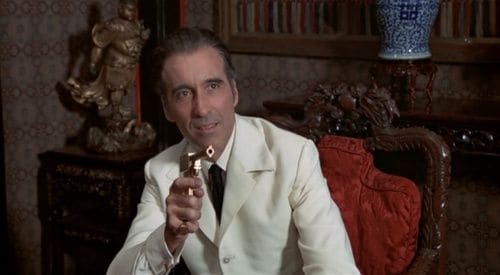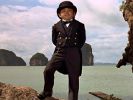Eye For Film >> Movies >> The Man With The Golden Gun (1974) Film Review
The Man With The Golden Gun
Reviewed by: Jennie Kermode

Variously decried as the weakest film in the Bond franchise and celebrated for featuring one of its best villains, The Man With The Golden Gun is deeply uneven and unsure of itself, but features enough impressive work to remind the viewer why the secret agent series is worth the effort. It may have John Barry's weakest score, one of the dimmest imaginable Bond girls and the silliest theme song lyrics of the lot (which is saying something), but it also has occasionally brilliant cinematography, and Christopher Lee's performance as master assassin Scaramanga should not be missed.
The second of Roger Moore's outings as 007, this film follows the similarly troubled Live And Let Die. When an inscribed golden bullet arrives at HQ, Bond concludes that the legendary Scaramanga must be after him, so sets out to find him first - only to find himself enmeshed in a more complex conspiracy. Scaramanga is certainly up to something, with his minions snatching secret pieces of technology linked to the burgeoning solar power industry, but he's not the only villain to pose a threat to Bond, and his mysterious lover (Maud Adams) may be up to something too. The mystery unravels in assorted exotic locales around Hong Kong and Thailand, with Bond aided by a resourceful police officer (Richard Loo), the previous film's comedy overweight American (Clifton James) and bumbling but scantily clad secret agent Mary Goodnight (Britt Ekland at her career worst).

The comedy angle is really he worst thing about the film. Bond films have always relied on a dark wit, but once they start signposting and laughing at their own jokes, they're in serious trouble. The slide whistle which ruins an otherwise impressive (but still cheesy) car stunt here is the series' nadir. Similarly embarrassing is the fight scene where Bond pits his fists against a succession of martial artists. Kung-fu was, of course, a huge fad in the cinema of the time, but Ian Fleming never pretended his hero was the best at everything, and watching this clumsy Englishman flailing around as talented stuntmen fall over on cue at his feet is quite painful. It's a relief when two minor female characters step in to save the day in a scene that's curiously more in keeping with today's cinema than that of the period.
Sadly, this is about as good as it gets for women in the film. Lois Maxwell's Moneypenny is pithy as always but, though Adams tries, she can't surmount the ugly situation her character is in, and the trivialisation of this within the narrative leaves rather a nasty taste in the mouth. Goodnight, meanwhile, is given a couple of moments to show 'pluck' but is generally simpering and useless, and Bond's treatment of her is callous throughout. Moore, at least, seems to recognise this and revel in bringing out the dark side of the character, but it's abut all he brings to the role; if he was wooden in Live And Let Die, here he's discount chipboard.
Alongside its treatment of women, its undisguised racism toward Americans and its cheerful use of every Chinese stereotype going, the film is particularly ugly in its treatment of Scaramanga's sidekick, the 3'11" Nick Nack (Hervé Villechaize). Bond's ridicule of his stature is treated throughout as if it were the height of hilarity, all the way to the film's pointlessly nasty concluding joke. This is not only unpleasant, it also diminishes the film because beneath it is the skeleton of a really interesting relationship, with Nick Nack the villain's sole companion and heir, and the dynamic between them is intriguingly underexplored. Like a less fortunate version of Goldfinger's Pussy Galore Nick Nack is quite possibly a grade A villain himself, his culpability dismissed merely because of his appearance.
So why is there still so much fuss made of such a problematic film? Part of it is the remarkable final showdown, a sequence that may not have Roger Deakins but that sees Ted Moore and Oswald Morris come into their own and Barr finally connect with the film just when his skill is most needed. A modernist triumph, it plays with colour, light and silhouette as hero and villain stalk each other through a shifting maze. It was apparently intended to show that Scaramanga could only hope to defeat Bond by confusing him; it comes across more the other way round, with interesting implications for the celebrated superspy, but it certainly succeeds at taking what could have been another tedious duel and turning it into something much more interesting, something that finally delivers the style the franchise is famed for.
Then there's Christopher Lee. Magnificent, aloof and clearly intellectually superior to everyone else in the film, he stalks through it like a predator who has never known what it's like not to be in command. For all his generous words, it seems unlikely that Scaramanga really considers Bond good enough to waste time on; he seems more like somebody who is bored with success and allows their final combat as a gift to himself, a needless but deliberate dicing with danger. Lee's real success, however, is in showing us the brutal side of this man's character; his scene with Adams is chilling in a way that goes far beyond the provisions of the script and comes just a little too close to real life for the Bond fantasy universe to endure. In sum, he gives a performance that will endure long after the rest of the film is forgotten; he is its meaning and purpose, towering over its cartoon action, reducing even 007 to a footnote. No golden guns necessary.
Reviewed on: 11 Jun 2015

















